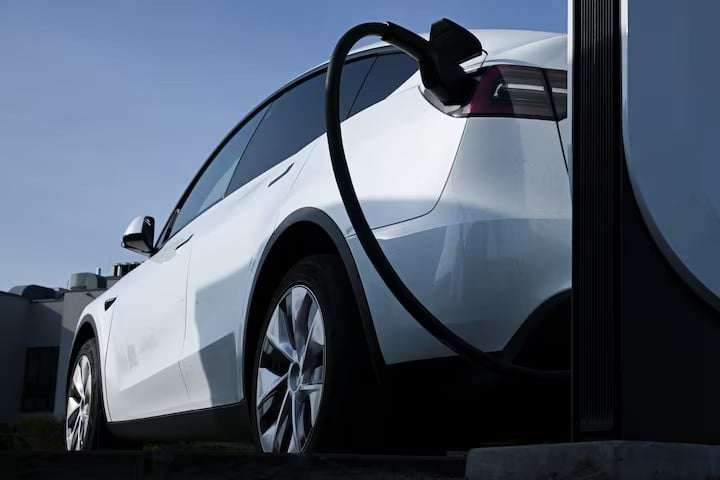
|
Getting your Trinity Audio player ready...
|
In a significant move towards accelerating the adoption of electric vehicles (EVs) in Pakistan, the Ministry of Commerce has proposed the removal of the sales tax on EVs and the lifting of the battery capacity cap on electric cars, vans, and SUVs. These proposals, which were discussed in a recent steering committee meeting, aim to streamline policies related to electric vehicles, making them more accessible to a larger population and stimulating the local manufacturing sector.
This article delves into the details of the proposal, its implications for the EV market in Pakistan, and other key initiatives that could potentially transform the country’s transportation sector.
H1: Key Recommendations to Boost Electric Vehicle Adoption
H2: Lifting of Battery Capacity Cap for Electric Vehicles
A major proposal that was discussed in the steering committee meeting was to remove the current restrictions on the battery capacity of electric cars, vans, and sports utility vehicles (SUVs). The removal of the battery capacity cap would give manufacturers more flexibility in designing EVs that cater to the growing demand for electric vehicles across different segments.
The additional secretary of the Ministry of Commerce emphasized that lifting the cap on EV batteries would enable Pakistan to manufacture more powerful and efficient electric vehicles, making them competitive in the international market. The move is expected to result in enhanced performance and better driving range for EVs, ultimately improving their appeal to the average consumer.
H2: Withdrawal of 25% Sales Tax on Electric Vehicles
Another critical recommendation made during the meeting was to eliminate the 25% sales tax on electric vehicles priced above Rs. 4 million. This tax, which has been a major deterrent to EV adoption, would be removed to incentivize consumers to purchase electric cars. By lowering the price barrier, EVs will become more affordable to a broader segment of the population, encouraging more people to make the switch from traditional gasoline vehicles to electric models.
The proposal to eliminate the sales tax is in line with the government’s efforts to promote clean energy solutions and reduce the carbon footprint. If approved, it will likely encourage domestic and international manufacturers to invest more in Pakistan’s EV market, potentially making the country a hub for the production of electric vehicles in the region.
H1: Expanding EV Infrastructure in Pakistan
H2: Installation of EV Charging Stations Across the Country
The development of a robust EV charging infrastructure is crucial for the widespread adoption of electric vehicles. In the meeting, the National Highway Authority (NHA) reported that it had already identified 40 locations along Pakistan’s motorways and national highways for the installation of EV charging stations. These stations will be spaced at intervals of about 120 km, ensuring that electric vehicle owners can easily access charging facilities on long journeys.
The NHA has also expressed its readiness to instruct oil marketing companies (OMCs) to install these stations, as mandated in their agreements. However, the final approval of the National Electric Vehicle (NEV) Policy is still pending, which has delayed the implementation of this initiative. The Ministry of Industries and Production (MoIP) has urged the NHA to expedite the installation of these stations and ensure that they are operational by January 15, 2025.
H2: Expanding EV Charging Stations at Petrol Pumps
The Capital Development Authority (CDA) has already developed regulations for the installation of EV charging stations at existing and new fuel stations. The CDA’s initiative requires existing petrol pumps to install at least one EV charging station, and new fuel stations will be required to install at least two. This initiative aims to integrate EV charging into the existing fuel infrastructure, making it easier for drivers to transition to electric vehicles.
These new regulations have been approved in principle by the CDA board, but they are contingent upon the approval of the NEV Policy. Additionally, NEECA, the National Energy Efficiency and Conservation Authority, has developed its own set of regulations for the installation of EV charging stations in various locations, including residential, commercial buildings, and public spaces. These regulations will ensure that the infrastructure needed to support electric vehicles is widespread and easily accessible to all consumers.
H1: Stakeholder Involvement in the EV Transition
H2: Involvement of Educational and Regional Institutions
The steering committee also discussed the introduction of a demand incentive scheme to promote EV adoption. As part of this initiative, the government plans to distribute 120 e-bikes free of cost to high-performing students who have completed their Higher Secondary School Certificate from public colleges across Pakistan. This program aims to raise awareness about electric mobility and encourage young people to adopt sustainable transportation options.
Moreover, the Punjab Information Technology Board (PITB) presented a framework for incentivizing EV adoption by focusing on platform development and user authentication processes. This framework will ensure that consumers have access to seamless services when it comes to purchasing, charging, and maintaining electric vehicles.
H2: Collaboration Between Different Authorities
The collaboration between various government departments, including the Ministry of Industries and Production, NEECA, NHA, and the CDA, is key to creating an effective policy framework for the electric vehicle ecosystem. The steering committee also stressed the need for these departments to align their efforts in ensuring the smooth implementation of EV-related regulations across the country.
In addition, NEECA will collaborate with provincial governments to develop and share regulations for the installation of charging stations in provincial capitals and major cities, further extending the accessibility of EV infrastructure.
H1: The Road Ahead: Challenges and Opportunities
H2: Overcoming Barriers to EV Adoption
While the proposed policies are a step in the right direction, several challenges remain. One of the primary concerns is the high upfront cost of electric vehicles, which remains a barrier for many consumers. The removal of the sales tax is a significant step, but more incentives are needed to further reduce costs and make EVs more accessible.
Another challenge is the need for a reliable and affordable power supply for charging stations. The Power Division has been tasked with addressing electricity-related issues and developing an implementation plan for dedicated power lines to ensure that charging stations receive uninterrupted power.
FAQs
1. What is the proposed sales tax elimination on electric vehicles in Pakistan?
The Ministry of Commerce has recommended the elimination of the 25% sales tax on electric vehicles valued above Rs. 4 million to make EVs more affordable and encourage wider adoption.
2. How many EV charging stations will be installed along Pakistan’s motorways?
The National Highway Authority (NHA) has identified 40 locations for the installation of EV charging stations along major motorways, ensuring accessibility for electric vehicle owners.
3. What is the demand incentive scheme for students in Pakistan?
Under the demand incentive scheme, 120 e-bikes will be distributed free of cost to high-performing students with Higher Secondary School Certificates from public colleges across Pakistan.
4. What regulations are being implemented for EV charging stations in Pakistan?
Regulations have been approved by the Capital Development Authority (CDA) for the installation of EV charging stations at petrol pumps, and similar regulations will be applied to residential and commercial buildings across the country.
5. How will Pakistan overcome the challenges in EV adoption?
The government is addressing challenges by removing sales tax, installing charging stations nationwide, and improving electricity supply for charging infrastructure to ensure smooth EV adoption.
MUST READ
https://skipper.pk/2025/01/15/workforce-exports-driving-pakistans-economy-amid-challenges/





